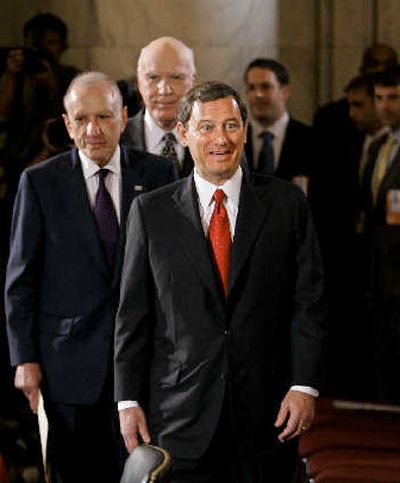Roberts says he’d judge ‘without fear or favor’

WASHINGTON – Supreme Court nominee John Roberts pledged Monday to judge with humility and “without fear or favor” if approved as the nation’s 17th chief justice and youngest in 200 years.
“I have no agenda,” he told the Senate Judiciary Committee at the opening of confirmation hearings.
“I have no platform. Judges are not politicians who can promise to do certain things in exchange for votes,” said the 50-year-old appellate court judge and former Reagan administration lawyer, picked by President Bush to succeed the late Chief Justice William Rehnquist.
He added, “Judges are like umpires. Umpires don’t make the rules; they apply them.”
Roberts sat ramrod straight in his chair in the crowded, ornate Senate Caucus Room through several hours of preliminary speeches by committee members before his turn came to speak. A pad of white paper and pencil placed in front of him went unused.
Even before he cleared his throat to speak at midafternoon, Republicans and Democrats on the committee sparred in anticipation of several days of questioning that lie ahead.
“It is not undignified to ask the nominee questions he would rather not answer, should he prefer to remain inscrutable, or worse yet, all things to all people,” said Sen. Russell Feingold, D-Wis. Several Democrats on the committee, mindful of the conservative positions Roberts took in legal memoranda written while working in the Reagan White House, said they intended to probe his views on issues such as abortion and civil rights.
“Don’t take the bait,” Sen. John Cornyn, R-Texas, advised Roberts. “Decline to answer any question you feel would compromise your ability to do your job,” he added, saying that has been the practice of nominees appointed by presidents of both parties.
The debate over the permissible limits of questioning masked deeper difference as the committee began hearings for the first Supreme Court nominee in 11 years.
“The central issue before us in these hearings is whether the Supreme Court will preserve the gains of the past, and protect the rights that are indispensable to a modern, more competitive, more equal America,” said Sen. Edward M. Kennedy, D-Mass., a liberal Northeasterner with more than four decades in office.
Speaking several minutes later from the other side of the committee dais, Sen. Lindsey Graham, R-S.C., rebutted forcefully. “To me the central issue is whether or not the Senate will allow President Bush to appoint a strict constructionist to the Supreme Court,” said the first-term Southern conservative.
Republicans said in advance the answer to Graham’s question was yes – and Democrats did not disagree that Roberts was on track for confirmation barring an unexpected turn of events.
Committee approval seemed assured, possibly by party-line vote, according to several GOP officials. Democrats have remained officially uncommitted pending the outcome of the hearings, although many have expressed skepticism.
One, Sen. Joseph Biden of Delaware, told Roberts during the day, “If I looked only at what you’ve said and written in the past, I would have to vote no.”
Republican officials said they hoped Roberts would pick up the support of some Democrats when his nomination reaches the full Senate. Majority Republicans intend to press for a final vote before the court opens its new term on Oct. 3.
The opening act of the confirmation drama played out in a room with history etched into its magnificent interior marble columns. Watergate hearings were held in the same Senate Caucus Room three decades ago. So, too, the stormy hearings for Robert Bork, whose nomination to the Supreme Court was defeated in 1987, and the stormier hearings that resulted in Clarence Thomas’ approval in 1991.
“As chairman, I am committed to conducting a full, fair and dignified hearing,” said Arlen Specter, R-Pa., the committee’s chairman shortly before he brought down the gavel to open the proceedings.
There was no dissent about the stakes.
“The balance and direction of the court are now at issue with two vacancies,” said Sen. Patrick Leahy of Vermont, the senior Democrat on the panel.
Several lawmakers noted that if confirmed Roberts might serve for several decades as chief justice. Not since John Marshall, confirmed in 1801 at 45, has there been a younger chief. Rehnquist, a mentor and the man Roberts would replace, was 80 when he died last week after struggling against thyroid cancer.
Roberts’ youthfulness was underscored when he entered the committee room followed by his two young children clinging close to his wife. There was Josie, 5, and Jack, 4, who was displaying his trademark rambunctiousness, first evident the night he squirmed his way through a White House appearance when Bush named Roberts for the high court.
For his part, Roberts may hold a record of sorts – nominated to succeed two different justices in a matter of weeks. Bush originally named him to succeed retiring Justice Sandra Day O’Connor in July. Rehnquist’s death this month led to a quick shuffle, and Roberts now seeks confirmation as chief justice while O’Connor will remain on the court until the president selects a new replacement.
Roberts spoke for less than 10 minutes – and without notes.
“If I am confirmed, I will confront every case with an open mind. I will be open to the considered views of my colleagues on the bench. And I will decide every case based on the record, according to the rule of law, without fear or favor, to the best of my ability,” he said.